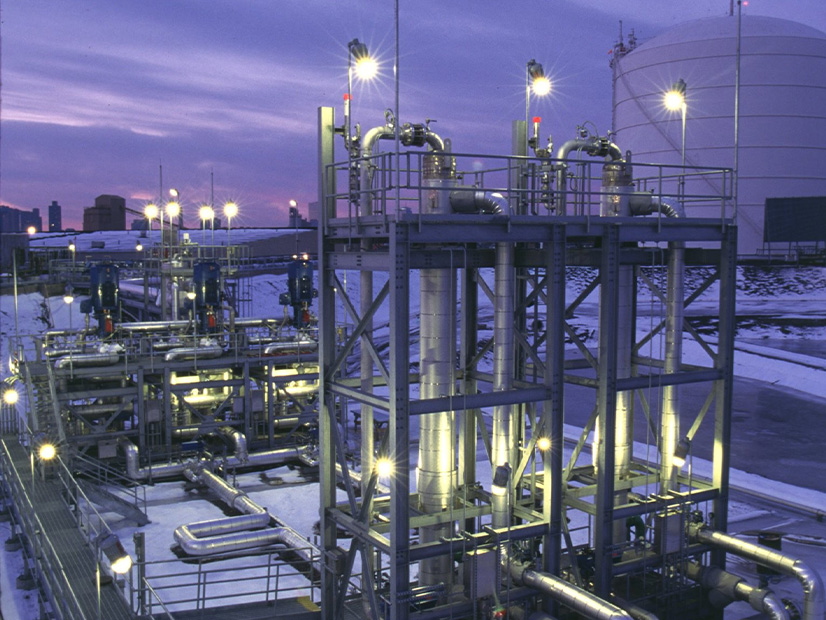Environmental justice ran into reliability at FERC last week as commissioners debated whether the “sky is falling.”
The question of whether the Weymouth Compressor Station in Massachusetts, part of Enbridge’s Atlantic Bridge pipeline project, is dangerous for the communities surrounding it was front and center as the commission resolved a paper briefing on the project at its monthly open meeting Thursday (CP16-9-012). (See FERC Rejects Calls to Shut Down Weymouth Compressor.)
But lurking in the background was a familiar debate over whether pipeline constraints and limited gas supply are a threat to the reliability of New England’s grid.
In his concurrence and partial dissent on the order, Republican Commissioner Mark Christie wrote that the facility “under attack” in the proceeding is necessary to help alleviate gas supply concerns in the region.
He made the point as part of a larger argument that the commission’s paper briefing revisiting its original certification of the project was part of a worrying trend.
“Even today in two other cases, the majority is issuing a new procedural rule that will drive up litigation costs and create new avenues to attack certificates after they have been issued,” Christie wrote. “These actions do not appear to recognize the reality that a reliable supply of natural gas will be critically necessary to keep the lights on and homes warm in New England and the rest of the country for years to come.”
Christie was referring to FERC’s approval of requests for additional time from two separate developers to complete construction of their gas projects: Adelphia Gateway, a pipeline upgrade and extension project in Pennsylvania (CP18-46-004); and Delfin LNG, which is constructing onshore facilities in Louisiana to transport gas to a new offshore LNG port, possibly the first in the U.S. (CP15-490-002). Both developers cited the COVID-19 pandemic as causes for the delays.
While both Christie and fellow Republican Commissioner James Danly concurred with the decisions to grant the requests, they dissented over a new procedural rule introduced by the Democratic majority that allows new intervenors each time a request for extension is filed. Christie argued in his dissent that the new policy “will undeniably drive up the legal costs associated with building gas facilities, creating yet another disincentive to the construction of vitally needed infrastructure.”
Christie sparred Thursday with Commissioner Allison Clements, who said that FERC’s two Republicans have been claiming that the “sky is falling on regulatory certainty.”
“Given my experience as an infrastructure project finance attorney who has dealt with the risk of policy change, I’m confident that the path to regulatory certainty does not lie in continuing to ignore the legitimate concerns of stakeholders. It does not lie in hiding behind blanket claims of reliability risk,” Clements said.
Christie retorted that an “honest reliability dialogue” will acknowledge that gas is an essential part of reliability.
“And what this commission has been doing over the last year has been absolutely drawing a lot of uncertainty into whether we’re going to stand behind gas projects or whether we’re going to let gas projects be built at all, or subjected to such additional costs as they become unfeasible. So it’s not a ‘sky is falling’; it’s reality,” Christie said.
Opponents have challenged the Atlantic Bridge project on several grounds, including that it may be used to export LNG to other continents, but FERC shot down that claim when issuing its approval to the project in 2017. (See Atlantic Bridge Project Approved by FERC.)
Region on Edge
ISO-NE offered a familiar but increasingly loud warning ahead of this winter season that gas pipeline constraints was one of the issues threatening the region’s cold weather reliability. (See ISO-NE: New England Could Face Load Shed in Cold Snaps.)
That has led to increasingly loud complaints from New England states that the grid operator hasn’t done enough to ensure that the lights stay on this winter.
First, Connecticut’s top energy regulator questioned whether ISO-NE was on top of fuel security concerns (See Conn., ISO-NE not Seeing Eye to Eye on Winter Reliability Worries.)
Last week, the rest of the New England states joined in with a NESCOE follow-up to that exchange along a similar line, suggesting that the RTO has not adequately replaced winter reliability programs that were halted in 2018.
ISO-NE “identifies immediate risks of sustained cold weather — an otherwise unremarkable occurrence for New Englanders — without any analysis of the magnitude of risk or any proposed way ISO-NE, the entity responsible for regional planning and system reliability, will act to address them,” NESCOE wrote.



